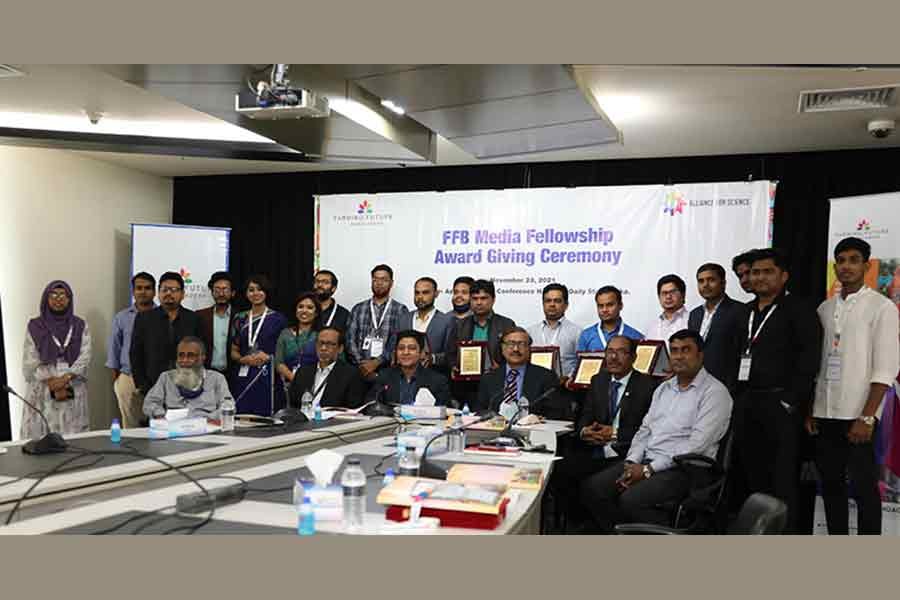Six journalists have been awarded with media fellowship for their impact reporting on the prevailing crises of food security, acute malnutrition and child health in the country on Tuesday.
They covered the field reporting on the ground of some poverty-driven regions including Kurigram, Gainbandha and Jamalpur on various crises in agriculture, maternal and child malnutrition and marginalised people’s food habits.
The fellowship titled ‘FFB Media Fellowship 2021’ was hosted by the Farming Future Bangladesh, a Bill & Melinda Gates supported organisation, while Alliance for Science, a US based global shaper in agricultural innovations provided the fellowship.
The fellowship recipients include journalists Abbas Uddin (The Business Standard), ANM Mohibub Uz Zaman (The Daily Sun), Al Amin (The New Nation), Mehedi Al Amin (The Business Post), and Shah Muhammad Najmus Sakib (The Financial Express).

Staff Reporter of The Financial Express Shah Muhammad Najmus Sakib receiving the fellowship
Speakers at the event held at the Daily Star Centre in Dhaka said that farmers are being deprived of fair prices due to lack of coordination among the ministries. And millers are hiking the price of rice due to lack of government stocks and coordination among the government agencies.
They also suggested taking special programmes in the poverty-stricken and areas with high malnutrition.
Anwar Faruque, former secretary of the agriculture ministry and chief guest of the event, said that the cost of transportation has varied, including in agriculture which is a double blow for the farmers.
“Prestigious media fellowships can inspire journalists across Bangladesh to report unbiased stories,” he added.
The keynote was presented by the General Secretary of Bangladesh Agricultural Journalist Forum (BAJF) and Deputy City Editor of Daily Bonik Barta Shahanuare Shaid Shahin.
He showed in his presentation that 85 per cent of the agricultural lands lost fertility, according to the government agency’s study while over 65 per cent of the country's farmers are landless which indicates a vulnerable condition of the country’s farmers, certainly in those poverty-driven regions.
He, in his presentation, emphasised on raising the food storage capacity of the government food storage capacity to 5.0 million tons in order to come out of the trend of importing main food items, including rice, despite sufficient production.
The special guest Dr Khalilur Rahman, director of Bangladesh National Nutrition Council, said, “Nutritious diet for all is essential to meet SDG 2, which wants to end hunger. Media fellowships are proof that journalists are doing their part to update us about the crisis in food security.”
He said that there is no food crisis in the country but people’s access to secure food is a question.
Md. Shahjahan Ali Biswas, Director of Agricultural Information Service said, “Adoption of modern agricultural methods can help us understand and tackle the current challenges in food and nutrition.”
Md. Arif Hossain, CEO and executive director of FFB, chaired the event.
Fellowship recipients received a crest and money each.


